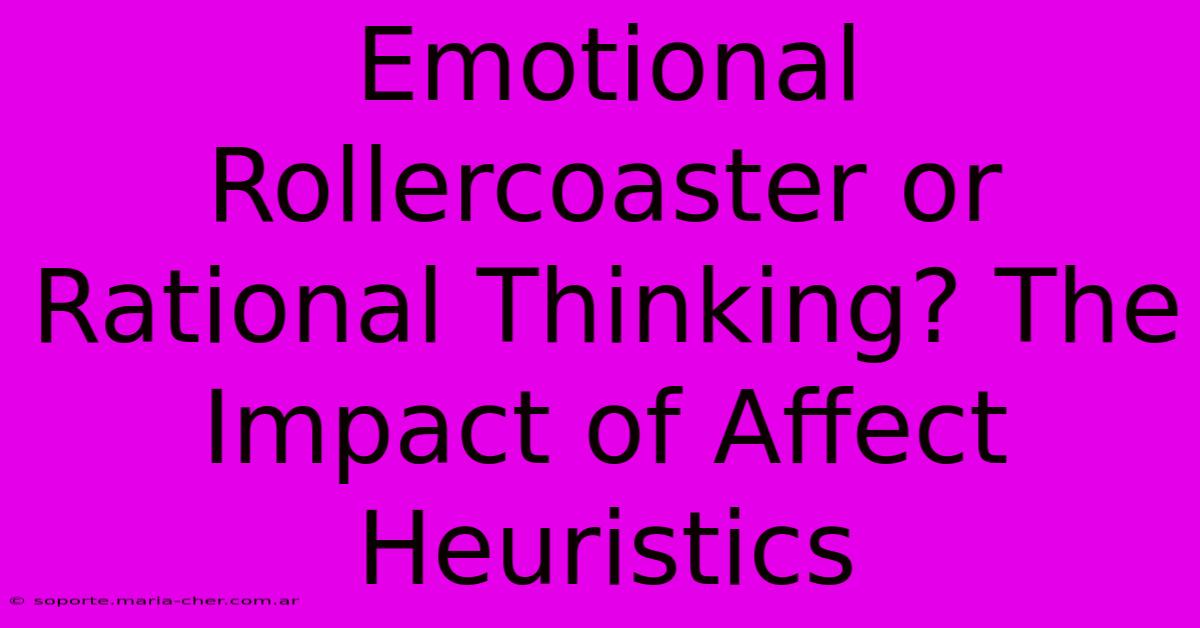Emotional Rollercoaster Or Rational Thinking? The Impact Of Affect Heuristics

Table of Contents
Emotional Rollercoaster or Rational Thinking? The Impact of Affect Heuristics
We often pride ourselves on being rational beings, carefully weighing pros and cons before making decisions. But the reality is far more nuanced. Our emotions, even subtle ones, exert a powerful influence on our choices, often bypassing our logical reasoning. This is the realm of affect heuristics, a fascinating area of behavioral economics exploring how feelings shape our judgments and decisions.
Understanding Affect Heuristics: Feeling Your Way Through Decisions
Affect heuristics describe the mental shortcut where we rely on our immediate emotional response – our "gut feeling" – to make judgments. Instead of meticulously analyzing information, we base our decisions on how something feels. If something feels good, we tend to view it positively; if it feels bad, we judge it negatively. This process is often unconscious and incredibly efficient, allowing us to navigate the complexities of daily life without getting bogged down in endless analysis.
The Two Sides of the Coin: Pros and Cons of Emotional Decision-Making
While seemingly irrational, affect heuristics have both advantages and disadvantages:
Advantages:
- Speed and Efficiency: Making quick, emotionally-driven decisions can be crucial in situations requiring immediate action. Imagine encountering a dangerous animal – your fear response allows for rapid escape, bypassing lengthy deliberations.
- Simplicity: Affect heuristics simplify complex choices, making decision-making more manageable, particularly when dealing with incomplete information.
- Motivation: Positive emotions associated with a particular choice can motivate action, whereas negative feelings can act as deterrents.
Disadvantages:
- Bias and Irrationality: Our emotions can lead to biased judgments and irrational decisions. Fear, for instance, can lead to overestimation of risks, while excitement can cause underestimation.
- Vulnerability to Manipulation: Marketers and advertisers cleverly exploit affect heuristics, using emotionally charged imagery and language to influence consumer behavior. Think of heartwarming commercials or fear-mongering political ads.
- Inconsistent Choices: Decisions based solely on feelings can be inconsistent and prone to changes in mood. What feels good today might feel bad tomorrow.
Real-World Examples of Affect Heuristics in Action
Affect heuristics are prevalent in numerous aspects of our lives:
- Investment Decisions: Investors often let their emotions – fear or greed – drive their investment strategies, leading to poor financial outcomes.
- Health Choices: Fear of illness can lead to excessive health anxiety and unnecessary medical interventions. Conversely, a lack of concern might lead to neglecting important health screenings.
- Product Purchases: Marketing campaigns often aim to evoke positive emotions (happiness, excitement) towards products, regardless of their objective qualities.
- Political Opinions: Strong emotional responses to political candidates or issues can overshadow rational evaluation of policy positions.
Overcoming the Influence of Affect Heuristics: Striking a Balance
While affect heuristics are a powerful force, we aren't completely at their mercy. We can develop strategies to mitigate their negative impacts:
- Emotional Awareness: Recognizing your emotional state before making a decision is crucial. Ask yourself: "How am I feeling right now, and how might that influence my judgment?"
- Information Gathering: Actively seek objective information to counter emotional biases. Look beyond the surface-level feelings and analyze the facts.
- Delaying Decisions: When possible, postpone important decisions to allow time for emotions to subside and rational thought to prevail.
- Seeking Outside Perspectives: Discuss decisions with trusted individuals who can offer a different perspective and help identify potential biases.
Conclusion: The Power of Rationality
Affect heuristics are an integral part of human decision-making. While they offer speed and simplicity, they can also lead to biases and irrational choices. By understanding the role of emotions in our judgments and employing strategies for emotional regulation and information gathering, we can strive for a more balanced approach – one that integrates the wisdom of our feelings with the power of rational thinking. This allows us to navigate the complexities of life with both heart and mind, making well-informed decisions that align with our values and long-term goals.

Thank you for visiting our website wich cover about Emotional Rollercoaster Or Rational Thinking? The Impact Of Affect Heuristics. We hope the information provided has been useful to you. Feel free to contact us if you have any questions or need further assistance. See you next time and dont miss to bookmark.
Featured Posts
-
Beyond The Picture The Story Behind Black And White Photo Spot Lighting
Feb 07, 2025
-
Empty Your Flyers For A Traffic Explosion Discover The Newest Marketing Technique
Feb 07, 2025
-
Leverage The Power Of Absence How Empty Effective Flyer Marketing Can Transform Your Campaigns
Feb 07, 2025
-
Wireframes On Steroids Amplify Your Designs With Our Data Minded Catalog
Feb 07, 2025
-
The Quantum Pine Cone How Time Curves And Distorts Our Reality
Feb 07, 2025
